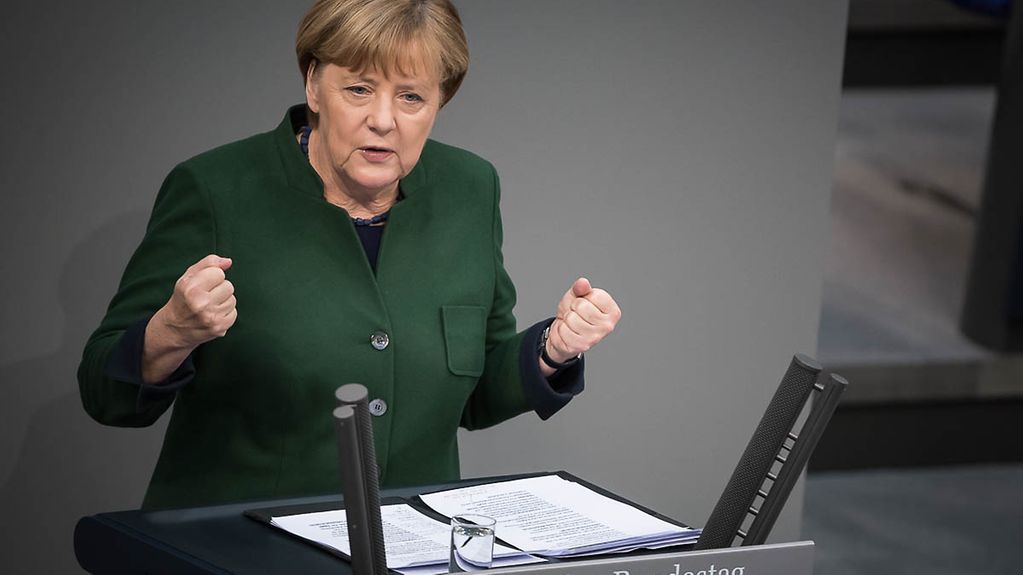Angela Merkel speaks during the budget debate
Speaking in the German Bundestag, the Chancellor has called for Germany to work with its partners and strengthen shared values rather than retreating into isolation, in the face of international terrorism and the conflicts in Syria and Turkey. The fight against terrorism, she declared, is part "of our freedom".
4 min reading time

In her speech the Chancellor criticised Donald Trump's rejection of the planned Trans-Pacific Partnerhsip (TTP)
Photo: Bundesregierung/Kugler
It is becoming apparent, underlined Chancellor Angela Merkel, during the general debate on the budget in the German Bundestag, "that what we thought we could take for granted, cannot be taken for granted". In view of the "deeply worrying, alarming developments" in Turkey, the conflict in Syria, and international terrorism, withdrawal and isolation cannot be the solution. Instead, Germany and its international partners and allies must together carry out into the world "the values that we believe are right and important".
Angela Merkel described international terrorism as a new, major, asymmetric threat, which is a challenge for Germany too. "It is part of everyday life for us and our cities. Fighting it is part of our freedom."
Criticising Turkey where appropriate
The Chancellor rejected criticisms voiced by the Turkish President Recep Tayyip Erdoğan that Germany is not doing enough in the fight against terrorism. The German government, she declared, is committed to this fight, as is every European government. There is no justification for the restrictions imposed on the freedom of the press and the arrest of thousands and thousands of people in Turkey, criticised Angela Merkel. She nevertheless advocated keeping the lines of communication with Turkey open.
The situation in Syria, particularly in Aleppo, fuels our anxiety every day, said Angela Merkel. There are too many indications that medical facilities have been targeted and bombed intentionally. This, she pointed out, is banned under international law and criminal prosecution must follow. "The Assad regime must be aware of this, and it is extremely regrettable that Russia is supporting this regime," said the Chancellor.
Addressing hate speech on the internet
At the start of her speech during the general debate on the 2017 budget, the Chancellor pointed out that in this era of social networks, opinions are formed quite differently. Opinions and reports abound on the internet that are not controlled for factual accuracy in the same way as traditional journalism.
Alongside fake news, Angela Merkel pointed to phenomena like social bots and trolls. She reported that she supports the efforts of Federal Interior Minister Thomas de Maizière and Federal Justice Minister Heiko Maas to ban hate speech on the internet.
G20 offers "the opportunity to give globalisation a human face"
The G20 presidency, which Germany will assume on 1 December, offers Germany "the opportunity to give globalisation a human face". Angela Merkel announced that Africa will be a focus of Germany’s G20 Presidency. The African continent, she said, has to date been furthest removed from global economic development.
Angela Merkel reasserted the fact that Germany, thanks largely to the positive experience it has had with its social market economy, should work to focus on "common ground and multilateralism in globalisation and on shaping this globalisation jointly with others".
European Union must decide faster
According to Angela Merkel, the 2017 budget reflects the priorities of the German government. Germany alone cannot resolve international problems. The rise in spending for development cooperation is thus "the right response to the challenges in the world".
The Chancellor described Brexit as a "serious setback" for the European Union, which is not currently delivering on its pledge to assure prosperity. As well as digitalisation and enhanced competitiveness, it is essential in this context to fight youth unemployment in particular. Europe, said the Chancellor, is "often very slow". She said, "Decisions must be taken more rapidly, and what is decided must be translated into practice. Otherwise Europe’s credibility will suffer."
Cohesion in the face of the refugee crisis
Angela Merkel praised the dedication of all the people who have helped cope with the refugee crisis. The last year has shown a "remarkable level of cooperation" and has demonstrated how so many full-time helpers and volunteers can pull together. The government, she said, has "organised and managed things". The EU-Turkey Agreement has made the fight against illegal migration more effective.
Germany can help resolve international issues like migration and wars, but Germany cannot on its own fight global hunger and it cannot resolve the problems of the world’s 65 million refugees. In this legislative period alone, the budget of the Federal Ministry for Economic Cooperation and Development has risen by two million euros. Spending on humanitarian aid has risen from 438 million euros at the beginning of this legislative period to 1.3 billion euros, giving people in refugee camps in Lebanon, Jordan and elsewhere the chance to live in dignity. "That is money spent in the right place," stressed the Chancellor.
"People in Germany have never had it so good"
Angela Merkel also looked at the successful budget policy of the German government. Since 2014 there has been no new borrowing at national level. Real wages and pensions are rising. In the nursing care sector, "enormous progress" has been made. Financial benefits in the care sector have risen by 25 per cent. "We can really say that the people in Germany have never had it so good."